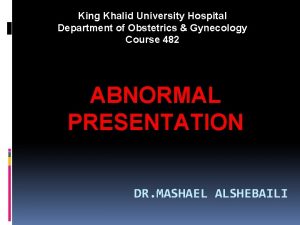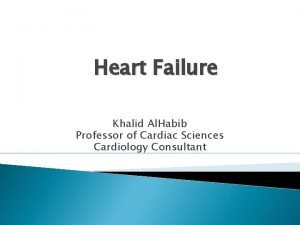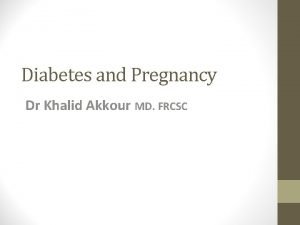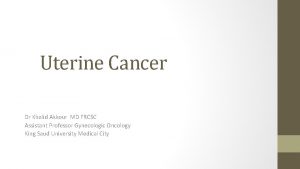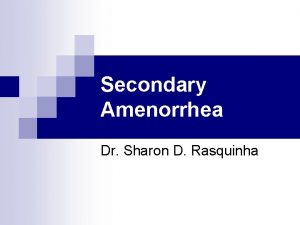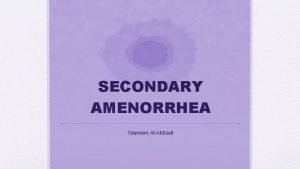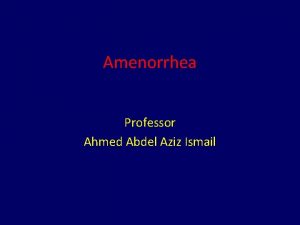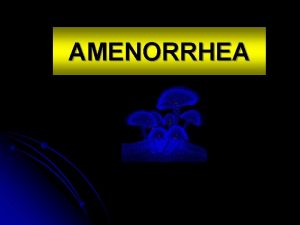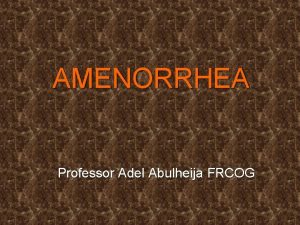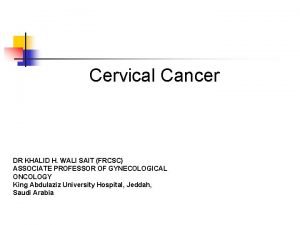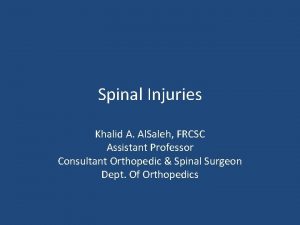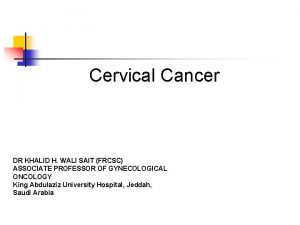Amenorrhea Khalid Akkour MD FRCSC Definitions Classification Amenorrhea























- Slides: 23

Amenorrhea Khalid Akkour, MD FRCSC


Definitions & Classification • Amenorrhea: Absence of menses. • Primary amenorrhea: Non occurrence of menarche by age of: • 14 with no secondary sex characters • 16 (18) with secondary sex characters. • Secondary amenorrhea: Absence of menses for 3 successive cycles.

Amenorrhea Pathologic False Physiologic True Imperforate hymen Vaginal T. septa Cervix CNS Puberty Hypothalamic Menopause Pituitary Pregnancy Ovarian Lactation Uterine General

False amenorrhea (Cryptomenorrhea)

Cryptomenorrhea • Due to outflow obstruction. • The most common cause is imperforate hymen. • Blood accumulate behind the hymen hematocolpos Hematometra Pelvic hemorrhage. • Diagnosis: • • • P. amenorrhea with good 2 ry sex characters. PMS. Urinary symptoms. Abdominal mass ? ? . Local examination is diagnostic. • Treatment: Cruciate incision under anesthesia Slow evacuation + antibiotics.

True amenorrhea

CNS Causes • Psychological troubles: • Psychosis # neurosis. • Pseudocyesis. • Anorexia nervosa. • Chronic stresses. • Weight loss. • Exercise: • • Loss of body fat. Stress of competition. Hyperthermia and dehydration. Euphoria of winning causing increased opiates.

Hypothalamic causes • Destruction: • • Trauma Inflammation. Tumors. Infiltrations. • Drugs: • Estrogens. • CNS affecting drugs. • Dysfunction & congenital disorders: • • • Chiari Frommel syndrome. Del Castillo syndrome. Kallmann syndrome. Laurence Moon Biedl syndrome. Frohlich syndrome.

Pituitary causes • Destruction: • Infiltrations. • Tumors. • Sheehan syndrome. • Drugs: • Estrogens. • Prolactin inducing drugs. • Dysfunction and congenital disorders: • Levi Lorain syndrome. • Empty sella syndrome. • Prolactinomas.

• Congenital: Ovarian causes • Turner. • Androgen insensitivity syndrome. • Traumatic: • Surgical removal. • Irradiation. • Inflammatory: • Mumps. • PID. • TB. • Neoplasia: • Benign. • Malignant. • Dysfunctions: • PCO. • Resistant ovary syndrome.

• Congenital: Uterine causes • Mullerian agenesis. • Uterine atresia • Severe hypoplasia. • Traumatic: • Surgical removal. • Irradiation. • Inflammatory: • Asherman syndrome. • TB. • Neoplastic: • Obstructing the cervix. • Dysfunctions: • Insensitive endometrium.

General causes • DM: • Glucose metabolism. • Ketosis. • Immunological. • Thyroid: • Hyper. • Hypo. • Adrenal: • Addison. • Cushing. • Debilitating diseases.

Causes of 1 ry amenorrhea 1 - Cryptomenorrhea: All congenital causes. 2 - True: • Psychological disturbances before menarche. • Congenital diseases in the hypothalamus or pituitary. • Ovarian dysgenesis and removal or destruction before menarche (T. B, irradiation). • Uterine aplasia or severe hypoplasia, T. B or removal before menarche. • General cause before menarche. • The most common causes of primary amenorrhea: • Gonadal dysgenesis. • Mullerian agenesis. • Complete AIS.

Causes of 2 ry amenorrhea • Physiological: • Pregnancy, lactation, after menopause. • Cryptomenorrhea: Any acquired cause. • True: • Psychogenic disorders after menarche, Chiari Frommel and Del Castillo syndromes, drugs, OCs, destruction by trauma, infections, tumors after puberty. • Sheehan syndrome, Simmond's disease, destruction and tumors after puberty. • Ovarian failure, PCO and ovarian tumors. • Intrauterine synechia, hysterectomy or T. B endometritis after puberty. • Any general cause after puberty.

Diagnosis of amenorrhea n. History: • • • Age, occupation, residence, habits and education. Primary or secondary amenorrhea. History of psychogenic disorders. History of neurological disturbances. History of endocrinological disorders. Past history of operations, pelvic infections, T. B, long drug course or irradiation. • Family history of similar condition, familial disease.

Diagnosis of amenorrhea • Examination: • Psyche, height, weight and span measure. Nutritional status should be also evaluated. • Secondary sexual characters. • Evidence of neurological disorders specially central lesions. • Evidence of endocrinological disorders with special reference to galactorrhea and hirsutism. • Evidence of general disease as heart, chest, renal or hepatic disorder. • Abdominal masses (ovarian, adrenal, renal hepatosplenomegaly or ascites). • External genital anomaly or hypoplasia. • Pelvic examination (PV or PR) for uterine and ovarian abnormalities.

Diagnosis of amenorrhea CNS Hypothalamus Pituitary Ovary Uterus Outflow tract

Diagnosis of amenorrhea • Special investigations – Step I: • • • Search for specific disease if suspected. Pregnancy test. TSH assay. Prolactin assay. Progesterone challenge test: • If (+)ve withdrawal Normal outflow tract and well estrogenized cases The cause is anovulation. • If (-)ve withdrawal Hypoestrogenic state or uterine cause step II.

Diagnosis of amenorrhea • Special investigations – Step II: • Give estrogen + Progesterone: • If (-)ve withdrawal Uterine cause. • If (+)ve withdrawal Normal outflow tract and uterus, and there is ovarian failure Step III • Special investigations – Step III: • Measure FSH: • If high Ovarian cause. • If low central cause.

Treatment of amenorrhea Treatment of the cause


THANK YOU
 Nationality vs citizenship
Nationality vs citizenship Khalid farhan course google drive
Khalid farhan course google drive Hydrocephalas
Hydrocephalas Khalid bakri
Khalid bakri Complete the tag question your name is ali khalid
Complete the tag question your name is ali khalid Samra khalid
Samra khalid Khalid mustafa
Khalid mustafa Dr sana riaz
Dr sana riaz Dr khalid jamal
Dr khalid jamal Khalid alsadhan
Khalid alsadhan Dr khalid waheed
Dr khalid waheed Khalid bazaid
Khalid bazaid When islam started
When islam started Khalid chaouch
Khalid chaouch Khalid bazaid
Khalid bazaid Paul howat
Paul howat Dr sana khalid
Dr sana khalid Khalid karaoui
Khalid karaoui Welcome to english class
Welcome to english class 911 in roman numerals
911 in roman numerals Fariza meaning
Fariza meaning Khalid al habib
Khalid al habib Nauman khalid md
Nauman khalid md Fariza khalid
Fariza khalid


